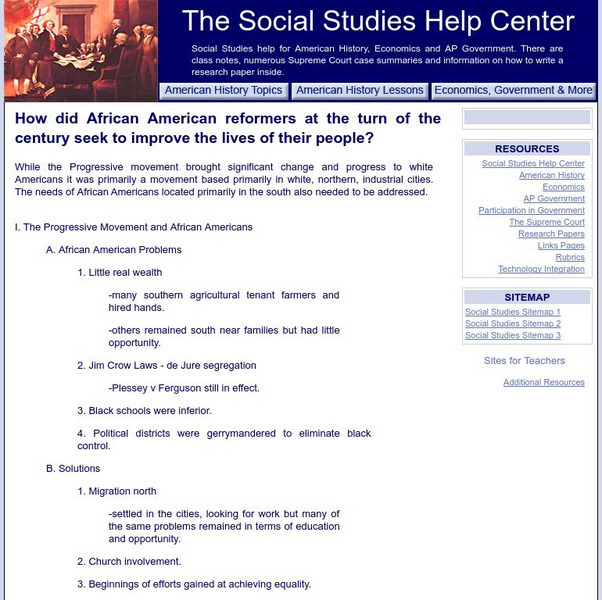Library of Congress
Loc: Address to the Country
Read Booker T. Washington's controversial speech arguing the importance of material advancement over integration for African Americans. He believed freed slaves needed to start at the bottom of the economic scale before moving up to...
Georgia Humanities Council and the University of Georgia Press.
New Georgia Encyclopedia: Atlanta Compromise Speech
An interesting article gives the background and ramifications of the Atlanta Compromise speech given by Booker T. Washington in 1895.
Digital History
Digital History: Two Paths Towards Equality [Pdf]
During the time of rising segregation in the late 19th century two African-American leaders offered two opposite views about how to advance civil rights for African-Americans. Read about the philosophies of those leaders. Booker T....
Georgia Humanities Council and the University of Georgia Press.
New Georgia Encyclopedia: Atlanta Compromise Speech
Booker T. Washington's Atlanta Compromise Speech is one of the most significant speeches in American history. Read the background of the speech, why it was controversial then and now.
ClassFlow
Class Flow: Booker T. Washington and w.e.b. Du Bois
[Free Registration/Login Required] This flipchart compares and contrasts the African American leaders of the late 1800's and early 1900's. It includes Venn Diagrams, quotes, pictures, and poetry.
Curated OER
Booker T. Washington
A speech by Mary Church Terrell, a letter by Booker T. Washington, a letter by W.E.B. DuBois, and the Niagara Movement's Declaration of Principles describe African American civil rights strategies in the early-twentieth century.
Independence Hall Association
U.s. History: w.e.b. Du Bois
Read a brief biography of W.E.B. DuBois, who was an early civil rights activist and supporter of equal opportunity and treatment for African-Americans. See how he acted on his beliefs. Included is a brief quiz about the Progressive Era.
National Humanities Center
National Humanities Center: Toolbox Library: African Americans, the Gilded and the Gritty: 1870 1912
A speech by Mary Church Terrell, a letter by Booker T. Washington, a letter by W.E.B. DuBois, and the Niagara Movement's Declaration of Principles describe African American civil rights strategies in the early-twentieth century.
Social Studies Help Center
Social Studies Help Center: Turn of the Century African American Reformers
A brief outline of information about African Americans & reform during the Progressive Era. Links to more information on Booker T. Washington, W.E.B. Du Bois, and Marcus Garvey.
Annenberg Foundation
Annenberg Learner: American Passages: Social Realism: W. E. B. Du Bois
W. E. B. DuBois is featured here for his writings which advocated human rights for all, but particularly for African Americans in the early twentieth century. Click "W. E. B. DuBois Activities" for related materials.
Curated OER
American Writers: Booker T. Washington & w.e.b. Dubois
A good informational site on Washington & Dubois. Includes general information about each one's life, works, and writings, including Up from Slavery and The Souls of Black Folk. Also includes links to other sites.
PBS
Pbs: The Black Press: Newspapers
At this PBS site, read about the histories of eight African-American newspapers: The Chicago Defender, The California Eagle, The Afro-American, The Pittsburgh Courier, Amsterdam News, Atlanta Daily World, Freedom's Journal, and Norfolk...
Annenberg Foundation
Annenberg Learner: American Passages: Class Consciousness in American Literature
This unit revolves around various social realist authors during the Gilded Age in America. Click the tabs for the list of authors, timeline, video and activities.
My Hero Project
My Hero: w.e.b. Du Bois
The fist African American to earn a PhD from Harvard, W.E.B. DuBois was not only an inspirational and extraordinary individual, but a champion in the fight for equality and the end of racism. Read about his founding of the organization...
Country Studies US
Country Studies: The Divided South
This site describes how after the Civil War, the South struggled to survive. By in large, efforts to attract industry failed and soon a strictly enforced social segregation system appeared and would last until well into the 20th century.
Curated OER
W. E. B. Du Bois
A speech by Mary Church Terrell, a letter by Booker T. Washington, a letter by W.E.B. DuBois, and the Niagara Movement's Declaration of Principles describe African American civil rights strategies in the early-twentieth century.
Curated OER
Mary Church Terrell
A speech by Mary Church Terrell, a letter by Booker T. Washington, a letter by W.E.B. DuBois, and the Niagara Movement's Declaration of Principles describe African American civil rights strategies in the early-twentieth century.




![Digital History: Two Paths Towards Equality [Pdf] Website Digital History: Two Paths Towards Equality [Pdf] Website](https://d15y2dacu3jp90.cloudfront.net/images/attachment_defaults/resource/large/FPO-knovation.png)







